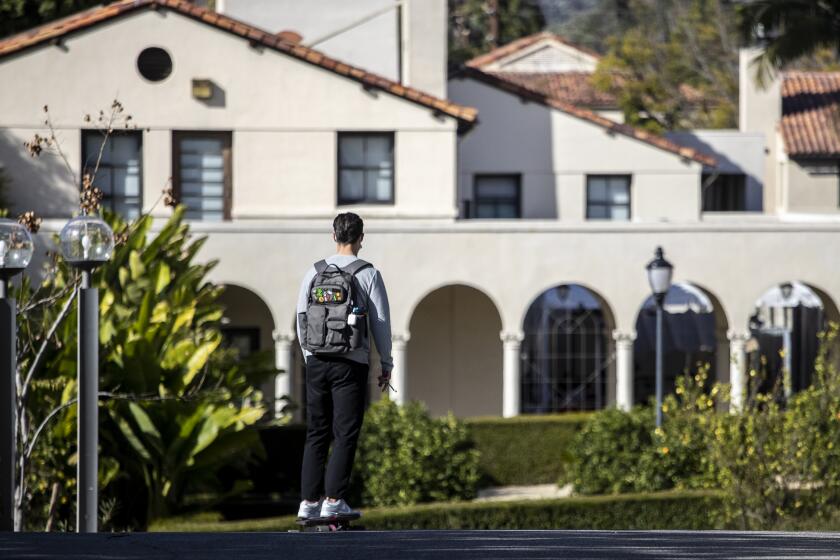Battle over legacy and donor admissions preferences to heat up. USC, Stanford could take hit

- Share via
The battle over legacy and donor admissions to college — the practice of giving special treatment to family of alumni and contributors — is about to heat up in California as critics take aim at what they see as a long-standing barrier for less privileged students to access elite institutions.
State Assemblyman Phil Ting (D-San Francisco) plans to renew efforts to deny state financial aid to any college or university that gives an admissions advantage to such applicants, who research has shown are overwhelmingly white and affluent. Ting’s plan comes as the recent U.S. Supreme Court ruling striking down race-based affirmative action in college admissions reignited a national outcry over the use of preferential treatment for legacy applicants.
USC, Stanford and Santa Clara University are the largest providers of legacy and donor preferences in California, according to annual data they submitted to the state for the last four years.
USC accepted 1,740 applicants with legacy or donor connections, or 14.4% of the fall 2022 admitted class, according to data submitted to the state. Of those, 96% were relatives of alumni and nearly 4% were connected only to donors. Stanford offered admission to 287 students, or 13.8% of the class — with 92% related to alumni and 8% with ties only to donors.
Santa Clara admitted 1,133 students with alumni or donor connections, representing 13.1% of the class. Four other campuses that used preferences did so more sparingly, amounting to 1% to 3.6% of the fall 2022 admitted class. Their data were not disaggregated for alumni and donor-only connections in the Assn. of Independent California Colleges and Universities’ report to the state.
The University of California and California State University, as well as Caltech, Pomona College and most of the 77 private undergraduate members of the independent college association, do not consider family or donor ties in admission decisions.
“This is about educational access,” said Ting, chair of the powerful Assembly Budget Committee, who plans to launch his campaign against legacy admissions this fall. “We grow up thinking that merit gets us into Stanford or Harvard or any of these elite institutions; that it’s really about having the best grades. But what you see is that there’s a very big back door for people who can just write the check. We shouldn’t be subsidizing or condoning that kind of behavior.”
USC, Stanford and Santa Clara declined to respond to specific questions about the pros and cons of their legacy preferences and whether they were considering eliminating them. But in their state reports and statements to The Times, they said all applicants are evaluated holistically and meet rigorous academic standards, with connections to alumni and donors one of many considerations. They also said they admit more low-income students eligible for Federal Pell Grants — and provide substantial institutional financial aid — than those with privileged ties.
The Supreme Court’s ban on affirmative action has triggered angst on campuses about how to promote diversity without considering race in admissions decisions.
“While we appreciate our alumni and donors and could not exist without them, those relationships do not guarantee admission to USC,” the university said in its report to the state last month. “In fact, those relationships will not help an unqualified applicant gain admission.”
The stakes are potentially high. At USC, 2,972 students received $26.6 million in Cal Grant financial aid in 2021-22, funding that could be jeopardized if Ting succeeds in penalizing institutions with legacy preferences. The lawmaker said they would need to offset the loss of state funds with their own philanthropy or risk turning away the low-income students who are eligible for Cal Grants.
At Stanford, 329 students received nearly $3 million in Cal Grants; at Santa Clara, 507 students received nearly $4.6 million, according to the California Student Aid Commission.
The California criticism is part of a broad reckoning for legacy preferences that could ultimately shake up college admissions and help reset who can access the top institutions that serve as gateways to some of the nation’s most prestigious, powerful and lucrative careers.
About 80% of 64 four-year colleges and universities with admission rates of 25% or less give children of alumni special treatment, according to a fall 2022 report by Education Reform Now. Overall, 787 institutions do so.
Most of those are private institutions in the Northeast, and Harvard is the top target for reform. Last week, the U.S. Department of Education opened an investigation into whether Harvard is discriminating on the basis of race by using donor and legacy preferences in its undergraduate admissions process in violation of federal civil rights laws.
A Boston-based nonprofit, Lawyers for Civil Rights, filed the complaint on behalf of three Massachusetts advocacy organizations and all students of color who have been systematically excluded from Harvard due to the “unearned and unfair advantage” for legacy and donor-related applicants, 70% of whom are white. Only 6% of applicants with no legacy connection were admitted, compared with 33% of those with family ties to alumni, the complaint alleged, based on data Harvard was made to disclose in the affirmative action lawsuit. Eliminating those preferences would increase Black, Latino and Asian American admission rates by up to 5% for each group and reduce white rates by about 4%, the complaint said.
Harvard has defended its legacy policies as a way to cement ties with alumni, encourage financial support for them and build community.
But such preferences also serve to perpetuate privilege across generations, according to a new study by Harvard economists. Children of parents who earn more than $611,000 annually — the top 1% — were 55% more likely to be admitted to one of 12 Ivy League and similarly selective schools than middle-class students with similar test scores. The biggest reason: legacy preferences, the report said.
Critics of all political stripes have spoken out against such advantages. President Biden has said legacy admissions “expand privilege instead of opportunity.” Conservative U.S. Supreme Court Justice Neil M. Gorsuch, in a concurring opinion on the affirmative action ruling last month, wrote that the preferences may be race-neutral on their face but “undoubtedly benefit white and wealthy applicants the most.”
The college essay, a crucial pitch in which applicants have limited words to describe who they are and why campuses should admit them, just got more stressful for students of color with the affirmative action ban.
Overall, 75% of American adults surveyed last year by the Pew Research Center said family ties should not be considered in admissions decisions — an increase from 68% in 2019. White people were most opposed to legacy admissions — 80% — compared with 67% for Latinos, 62% for Black respondents and 59% for Asians. More than three-fourths of Republicans and Republican-leaning respondents opposed them, as did 72% of those who are Democrats or lean Democratic.
Last week, Democrats in Congress reintroduced legislation that would bar federal financial aid to colleges that favor legacy or donor applicants. Wesleyan University, an elite liberal arts institution in Connecticut, announced it would drop those preferences.
Occidental College became the latest California campus to formally end legacy considerations, announcing last week that it would no longer ask applicants about family connections to alumni. The small liberal arts college has not in practice given legacy advantages to applicants for years, but leaders decided to formalize that stance while they were reviewing admission policies after the affirmative action ruling, said President Harry J. Elam Jr.
“What we want to do is ensure access and opportunity for all students,” Elam said in an interview last week. He added that campus community members, including alumni, have been “really positive” about the move and see it as Occidental’s commitment to justice, equality and public service.
More than 100 colleges and universities have dropped legacy preferences since 2015, according to the Education Reform Now report.
Sign up for This Evening's Big Stories
Catch up on the day with the 7 biggest L.A. Times stories in your inbox every weekday evening.
You may occasionally receive promotional content from the Los Angeles Times.
One of them is Pomona College, a top-ranked liberal arts institution that formally announced in 2020 it would not use legacy preferences. Seth Allen, dean of admissions and financial aid, said that the college had not been admitting students based on alumni ties, but the campus had no official policy on the issue.
As other priorities grew — adding more students from low-income, first-generation or international backgrounds and those talented in the arts and athletics — “it became very very clear that we were having a hard time just managing all of the priorities that various parts of the college wanted to see in the class and there would be no way that we could accomplish that and also have something like a legacy policy,” he said.
Allen said there were mixed reviews of Pomona’s decision, including those who feared it would drive away alumni donations. But he said that has not happened, with financial support at or above past levels.
Legacy preferences first came into use in the Ivy League in the 1920s and 1930s — in part, some scholars argue, to bake in historical advantages for white, affluent, Protestant males as highly qualified Jews were beginning to earn more seats at Columbia, Harvard and Yale. Although both Republicans and Democrats have questioned legacy preferences for decades — the late Republican Sen. Bob Dole once called it an unseemly “caste system” in American education — change has been slow as many campuses have defended their legacy policies as a way to instill multigenerational loyalty and ensure alumni engagement and donations.
But the 2019 Varsity Blues admission scandal, which exposed how rich parents bribed their children’s way into elite colleges, prompted some efforts to reel in those advantages. And the ruling against affirmative action has sparked sharp questions over why campuses now barred from considering race in admissions should still be allowed to consider privileged connections to alumni and donors that disproportionately benefit white applicants.
Ting first attempted to cut off state financial aid to institutions giving special treatment to children of alumni and donors after the Varsity Blues scandal. But he watered down his legislation to a data collection bill after the higher education lobby and some fellow Democrats expressed concern that a funding cutoff would jeopardize the ability of low-income students to attend those schools if they could not access Cal Grant financial aid.
Federal prosecutors accused top CEOs, two Hollywood actresses and others of taking part in an audacious scheme to get their children into elite universities through fraud, bribes and lies.
Despite the law’s weaknesses, it compelled private undergraduate campuses that receive Cal Grant funding to publicly disclose their legacy and donor-related admissions data for the first time. Among 72 qualifying institutions, only seven reported that they gave such preferences for the fall 2022 admitted class: USC, Stanford, Santa Clara, Claremont McKenna College, Harvey Mudd College, Pepperdine University and Vanguard University of Southern California.
USC, in its state report, explained that some students with a connection to the university — through family members who are alumni, donors or potential donors — receive a “special interest tag” in their admission file. The tag does not guarantee acceptance or fast-tracking of their application, USC said. But it gives them a second review by a senior admissions official. That practice of special tags came under scrutiny during the Varsity Blues scandal, which led to criminal convictions against three USC athletics officials and some parents. USC disavowed any quid pro quo of admission for donations in its report to the state.
“Although philanthropy is necessary to sustain any university, there cannot be, and will not be, a system that permits any person to ‘buy’ admission to USC,” the university told the state.

Subscribers get exclusive access to this story
We’re offering L.A. Times subscribers special access to our best journalism. Thank you for your support.
Explore more Subscriber Exclusive content.
USC, Stanford and Santa Clara, in statements to The Times, highlighted work with low-income students to consider alongside its special treatment for privileged applicants. USC touted its long-standing program to annually prepare nearly 1,000 underserved middle and high school students for competitive college admissions. Stanford described how it has expanded financial support for students from lower- and middle-income families, including covering tuition, room and board for those with incomes of less than $100,000.
But equity advocates want more.
Shaun Harper, founder and executive director of the USC Race and Equity Center, said evidence makes “painfully clear” that beneficiaries of legacy admissions are overwhelmingly white and any unearned advantage is simply inequitable. USC and other prominent campuses need to end legacy admissions in order to accelerate the national campaign for full access and opportunity for all students, he said.
“One of these institutions has to step out first and I would be so proud if it were us,” the USC scholar said. “It’s time.”
More to Read
Sign up for This Evening's Big Stories
Catch up on the day with the 7 biggest L.A. Times stories in your inbox every weekday evening.
You may occasionally receive promotional content from the Los Angeles Times.

















